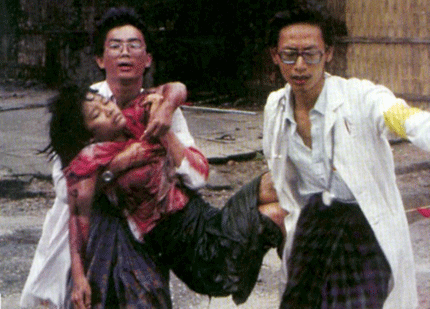
| By KYAW ZWA MOE | Friday, October 5, 2007 |
(Page 2 of 4)
Nilar Thein spent eight years and nine months in two notorious prisons, Insein and Tharawaddy. She emerged from jail with her spirit unbroken and her determination to work for democracy as strong as ever.
“The benevolence of those young women towards the country is invaluable,” said Kyi Oo.
Nilar Thein also appears to be invaluable to the authorities, who have offered a reward of several hundred thousand kyat for her capture. Photographs of her and other wanted activists have been widely distributed by the security forces, whose lack of success in tracking most of them down speaks volumes for the amount of popular support the fugitives enjoy.
The wanted activists were even able to continue their campaign by telephone from their hiding places until the authorities blocked their numbers and those of their activist contacts.
In one phone conversation, HIV/AIDS activist Phyu Phyu Thin, 35, explained why young women with families to care for were so actively engaged in the struggle. Their feminine nature, their “sympathy and emotion,” drove woman to “sacrifice,” she said.
 |
| Women activists actively join a Rangoon demonstration in August [Photo: Myat Moe Maung/The Irrawaddy] |
Phyu Phyu Thin was first arrested in September 2000, along with 30 women members of the NLD, when they gathered at Rangoon railway station to say farewell to party leader Aung San Suu Kyi, who was heading to upper Burma. The group spent the next four months and four days in an annex of Rangoon’s Insein Prison.
Like Nilar Thein before her, Phyu Phyu Thin’s resolve to fight official misrule and injustice remained unshaken after her time in prison. She determined to devote her entire life to the pro-democracy movement.
The junta’s attempt to break her spirit had misfired—“That’s their mistake,” Phyu Phyu Thin laughed. Before her arrest she had worked only occasionally at the NLD headquarters. After her prison experience, she rarely missed a single day.
That prison experience transformed her feminine compassion and emotion into a stronger commitment. She recalled such injustices as the case of three sisters who played no part in politics but who had been sent to prison because their brother had participated in an anti-junta demonstration in Japan.
Phyu Phyu Thin has won many sympathizers because of her work with HIV/AIDS patients, and when she was arrested again last May they demonstrated successfully for her release.
During last month’s demonstrations she was sheltered by one patient, who told her: “You shouldn’t be arrested.” Over the past five years, Phyu Phyu Thin has cared for about 1,500 patients who were neglected by the state.
The number of women political prisoners in Burma exceeds 50, according to the Thailand-based Assistance Association for Political Prisoners (Burma). The association estimates that since the 1988 uprising, more than 500 women have served prison terms because of their political involvement.
 |
| Win Maw Oo, a 15-year-old Rangoon student, is rushed to hospital by two medics after being shot by the junta’s troops during the 1988 uprising. She later died |
The roots of women’s involvement in politics and power-wielding in Burma go very deep, reaching back several centuries.
In the Pagan era, from the 11th to the 13th century, Queen Pwa Saw’s just reign won the affection and respect of male rulers. Queen Shin Saw Pu, who ruled the Mon Kingdom from 1453 to 1472, was also famous for her effective governance.
Two queens of the Konbaung period (1752-1885)—Nanmadaw Me Nu and Sin Phyu Ma Shin—won respect for their strong will and effective involvement in government. Burma’s last queen, Supayalat, exercised great power over King Thibaw and worked closely with ministers in managing the affairs of state.
Women took to the battlefield in early military encounters with British colonialists.


Thailand Hotels
Bangkok Hotels
China Hotels
India Hotels

|

